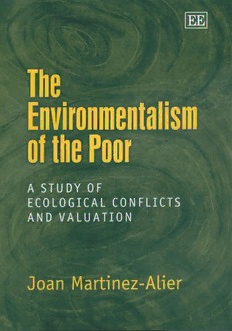
The Environmentalism of the Poor: A Study of Ecological Conflicts and Valuation PDF
325 Pages·2002·8.474 MB·English
Most books are stored in the elastic cloud where traffic is expensive. For this reason, we have a limit on daily download.
Preview The Environmentalism of the Poor: A Study of Ecological Conflicts and Valuation
Description:
This text analyses several manifestations of the growing "environmental justice movement", and also of "popular environmentalism" and the "environmentalism of the poor", which will be seen in the coming decades as driving forces in the process to achieve an ecologically sustainable society. The author studies, in detail, many ecological distribution conflicts in history and at present, in urban and rural settings, showing how poor people often favour resource conservation. The environment is thus not so much a luxury of the rich as a neccessity of the poor. It concludes with the fundamental questions: who has the right to impose a language of valuation and who has the power to simplify complexity?
See more
The list of books you might like
Most books are stored in the elastic cloud where traffic is expensive. For this reason, we have a limit on daily download.
